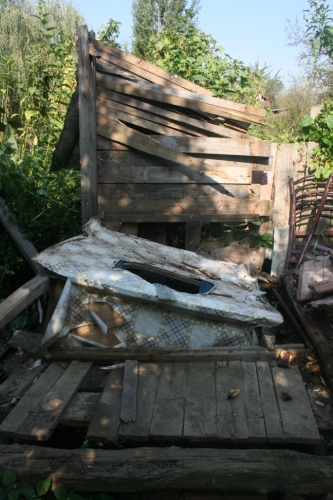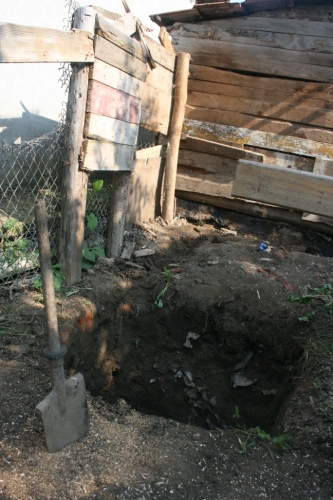I’ve
used all kinds of toilets. This year my toilet repertoire has
definitely been expanded. A toilet is the kind of thing you don’t
realize is a luxury until it’s not there – until when they say
“toilet” what they really mean is, “hole in the ground.” The
outhouse is something I’ve used in the past, and have become
increasingly familiar with throughout the year. However, the other
day was the first time in my life I think I’ve ever really been faced
with the reality of the life cycle of the outhouse.
 Outhouses
Outhousesare a pretty simple creature. They really only consist of three
things. First, you need a hole – the deeper the better. Second,
preferably you would have somewhere to sit. This I have learned is
more of a luxury than necessity (I’ve also decided throughout the
year that some cultures have actively chosen to reject the sitting
method altogether). Third, some kind of shelter must be constructed
around the hole and/or accompanying seat. Complete steps 1-3, and
ta-da! you’ve got an outhouse. The outhouse lives a long, useful
life – a happy companion to any family. But what happens on the
day an outhouse dies? What happens when there’s simply, “no more
room in the inn?” You tear it down and build a new one of course,
which is where I found myself just a few days ago.
outhouse day! Adi came in and informed us that the old hole was
full, and a new one needed to be made – so we grabbed some shovels
and got to work. David even came out to help. We dug through soft
dirt, hard dirt, mud, trash, and probably poop with half-broken, dull
shovels until Adi said it was deep enough (about chest height). The
next step was to try to move the existing outhouse structure all in
one piece. The outhouse was awkwardly both too sturdy and not sturdy
enough to successfully accomplish the transplant, so, naturally we
took an ax and knocked it down. Some of the wood was re-used, some
new additions were made, but I’m happy to say our backyard is now
home to a brand new outhouse.
I
tell you all this only in an attempt to accurately set the scene for
a lesson God taught me through this whole process.
The
whole time we were working outside, David was there, just a few  steps
steps
behind us – wanting to be a part of what we were doing, wanting to
be big and do the things his dad can do. Really what he wanted was
to be near and be like his dad. As I watched this unfold and
progress throughout the afternoon, I watched David get excited at his
successes – at the moments when he really felt like he was helping,
when he was working with his dad. I saw the joy and patience in
Adi’s face as he watched his son – as he saw a piece of himself
alive and excited to help – to be near him.
David
can’t do all the things his dad can, but he wants to help. He wants
to be a part of it. He wants to be like his dad. As we dug the hole
for the outhouse, David was next to us, tiny shovel in his hands,
digging away. He would help, kind-of, and sometimes he would even
knock dirt back in the hole. The beautiful thing is, despite his
inabilities, and even though sometimes it’s counter-productive, Adi
wants David to help. He wants to be with him. Adi loves David’s
willing heart. Adi takes joy in David’s success and the failure
because he knows that both are teaching him – both are part of his
growth.
 Sure
SureDavid may, at times, in trying to help, puts dirt back into the hole
– but his dad shovels out five times that amount with each scoop.
David’s dad is bigger than his inabilities or mistakes. Looking at
it through human eyes you might think this would be frustrating for a
father, but his love and patience for his son are inexhaustible.
Just as much as David loves being near his dad, his dad loves being
near him. Is he annoyed or frustrated that in his efforts to be like
him, David is sometimes innocently counter-productive? Of course
not. Adi is bigger – his love is bigger. David can not get in the
way of what Adi truly wants, because at the heart of it, David is
what Adi truly wants – closeness, intimacy, relationship with his
son.
Why
do we so often think that God is a different kind of father? Why do
we assume that he needs us to dig a perfect hole in order for him to
love us? Why is it so hard for us to believe that it’s really just
enough to enjoy being near him – to want to be like him? Why are
we convinced that he is keeping track of the number of times we
successfully take dirt out, or the times we “fail” and knock a
little dirt back in? More importantly, why are so caught-up in
monitoring everyone else’s digging?
has been speaking to me a lot about this lately. About how he has
already done the work. About how it’s not about the hole at all, but
loving who we dig it with. About our heart in it all. We have an
awesome father who loves being close to us. We have a father who
loves to work with us. We have a father who is bigger than our
inabilities. We have a father who takes joy in our successes and
failures – because he knows both are an essential part of our
growth. We have a father with inexhaustible patience and love. We
can not get in the way of what God truly wants, because at the heart
of it, we are what he truly wants – closeness, intimacy, and
relationship with his kids.









